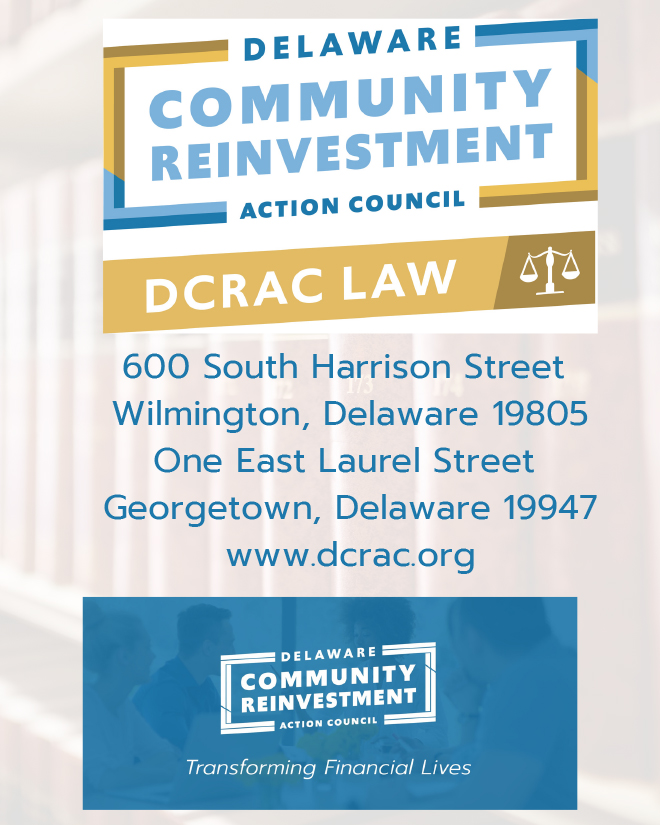“What About All My Stuff?”

By Jaclyn Quinn, Esq.
Delaware Community Reinvestment Action Council, Inc.
When I meet with estate planning clients, a recurring theme is what they plan to do with their belongings after they pass away—which many leave to their families, children, or other loved ones to figure out. But that can be a complicated burden in the best of circumstances, which is why I always advise clients to declutter and pass along their possessions now—especially sentimental items—or at least to start designating what will go to whom. By doing this sooner rather than later, the giver can know their things are going to the right place, and the recipients can appreciate the gesture directly.
But when it comes to downsizing, the decluttering step is just one of many—and I say that from experience! It takes a lot of work to make this transition a smooth one for all involved, whether it’s initiated by a need for relocation, simply wanting a smaller or more accessible home, or moving due to care reasons.
Beyond estate planning, here are tips for helping parents and loved ones downsize effectively and with minimal stress.
1. Start Early
One of the most important things to remember when downsizing—whether for yourself or other loved ones—is to start early and proactively. Moving can be a time-consuming and emotional experience, so it’s essential to have plenty of time to sort through belongings and make decisions about what to keep, donate, or discard. Begin by creating a timeline and setting realistic goals for each stage of the process, from looking for housing to staying accountable for following through. Don’t be afraid to enlist the help of friends, family members, or professionals along the way, as having extra hands on deck can make the process more manageable and less overwhelming for everyone involved.
2. Have a Plan
Before diving in, sit down and create a detailed plan with everyone involved in the downsizing process. This should include everything from sorting through belongings to packing and moving logistics—as well as where you might need outside help like an estate planner or realtor. Ensuring everyone is on the same page, particularly when it comes to important milestones and knowing where everything will go, is crucial to a smooth transition. Downsizing is almost always an emotional process, particularly if you or your loved ones are parting with cherished possessions or saying goodbye to a home filled with memories, so allow time for everyone to process their feelings and make decisions.

3. Declutter Thoughtfully
Sorting through a lifetime of possessions can be daunting! That’s why it’s essential to approach it with sensitivity and empathy, especially if you’re assisting parents or others in their task. Encourage them to focus on prioritizing what holds sentimental value or is truly essential to their daily lives—not stuff they simply have room for or are used to seeing around. Downsizing is an opportunity to simplify surroundings and create a more manageable living arrangement; the last thing anyone wants to deal with is packing unwanted items only to go through everything again on the unpacking side, or through an estate.
4. Get Creative with Storage Solutions
When moving to a smaller home, you’ve got to maximize storage space! But that can be fun in its own way, as you get creative with storage solutions such as under-bed containers, wall-mounted shelves, and multifunctional furniture, as well as repurposing existing units in new ways. Encourage everyone to prioritize hanging on to items that serve a practical purpose and to let go of duplicates or anything that no longer works in a new, smaller space.
5. Focus on the Positive
Finally, remember to focus on the positive aspects of downsizing and the journey and adventures ahead. Living in a smaller home has its own benefits, like reduced maintenance, lower expenses, and greater freedom. This transition can be an opportunity for a fresh start and the chance to create a living space that truly reflects your current and near-future values and priorities, without being weighed down by a lifetime of “things” to address or longstanding habits to uphold.
Downsizing can be challenging and emotional, especially if you’re helping someone else through the process. But with careful planning, patience, and support, it’s possible to navigate this transition successfully. By starting early, having a plan, decluttering thoughtfully, and focusing on the positive aspects of downsizing, you can transition—or help your parents or others transition—to a smaller home with grace and dignity. Remember to respect everyone’s emotions, get help when needed, and celebrate this new chapter in life. Once the dust settles and the move is complete, take some time to review (or create) estate plans to make sure everything is still accurate and in order. And then start enjoying the new phase in life!
If you need legal advice, Jaclyn Quinn and her colleagues at the Delaware Community Reinvestment Action Council are available to assist with estate planning, including updating an existing plan. For more information, or to schedule a consultation, please call (302) 298-3251 or email [email protected]. For more information, visit www.dcrac.org.
Bio
Jaclyn Quinn, Esq. joined the Delaware Community Reinvestment Action Council (DCRAC) in 2011, first as a volunteer, then as staff. In 2014 Jaclyn opened and grew her private practice until 2019, when DCRAC Law opened to the community. DCRAC Law is a nonprofit law firm providing tax, title, and other legal services to those unable to pay market rates.
Jaclyn graduated with a B.A. in Political Science from The College of New Jersey before moving to Delaware to pursue her J.D. at Widener University- Delaware Law School. She was admitted to the Delaware Bar in 2012, and is also barred in U.S. Tax Court and U.S. Immigration Court. She has volunteered with the Office of the Child Advocate, DVLS, and assists as pro bono counsel in a variety of cases.
Jaclyn Quinn, Esq. Delaware Community Reinvestment Action Council (DCRAC)
302-298-3251 [email protected] www.dcrac.org
@dcracdelcra on instagram & @DCRACDelCRA on facebook
600 South Harrison Street, Wilmington, Delaware
One East Laurel Street, Georgetown, Delaware


